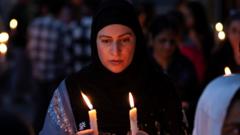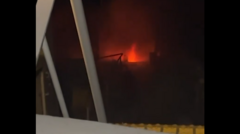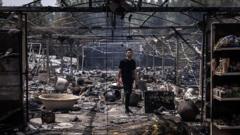The situation underscores a fragile security landscape that threatens to reignite Syria’s civil conflict, fueled by a mix of local unrest and international geopolitical tensions.
Tensions Escalate in Syria's Druze Regions Amid Violent Clashes

Tensions Escalate in Syria's Druze Regions Amid Violent Clashes
Violence in the Druze areas near Damascus signifies ongoing instability as external interventions complicate the post-Assad era.
Deadly clashes have erupted in the Druze areas near Damascus, raising alarms about the increasing instability in Syria post-Bashar al-Assad's regime. The violence, involving Islamist factions and security forces, has prompted intervention from Israel, which conducted airstrikes aimed at protecting Druze civilians. The spiritual leader of the Druze community labeled the conflict an "unjustifiable genocidal campaign," illustrating the community's deep vulnerability amid a political landscape marked by fracture and division.
In the wake of Assad's removal from power, the new Syrian authority pledges to cultivate unity and stability; however, skepticism looms large both domestically and internationally. Opposition groups, including the Islamist faction Hayat Tahrir al-Sham (HTS), continue to challenge the authority of the current government, with territories like Idlib and the northern regions remaining largely outside of state control. The Druze community, an Islamic offshoot, has also sought a degree of autonomy, adding another layer of complexity to an already tense scenario.
The latest unrest erupted when clashes broke out south of Damascus involving multiple armed groups, resulting in significant casualties. According to reports, over 100 people have died, with both Druze fighters and security personnel among the deceased. The violence is reportedly linked to inflammatory rhetoric and social media posts that escalated local tensions.
To mitigate the crisis, Syrian authorities have attempted to establish ceasefires with Druze leaders, but the underlying issues that incited the violence—fueled by mutual distrust among different religious and ethnic groups—remain unresolved.
Internationally, Israel has intensified its military presence in southern Syria, citing security concerns regarding the new Islamist-led authorities. Israeli Prime Minister Benjamin Netanyahu has condemned the current Syrian government's stance, calling for complete demilitarization in the area while presenting Israel as a protector of the Druze citizens. This dynamic complicates Syria's efforts toward a stable future amid international scrutiny.
Turkey also plays a significant role in this complex geopolitical landscape, having fostered ties with Syrian opposition factions that displaced the Assad regime. The ongoing tension between Israel and Turkey underscores the multiplicity of interests at play, presenting formidable obstacles to achieving long-term peace in the region.
The potential for a resurgence of violence looms large, emphasizing the urgent need for comprehensive international support to rebuild Syria and address the multitude of challenges facing its people, who have endured years of hardship due to relentless conflict.


















